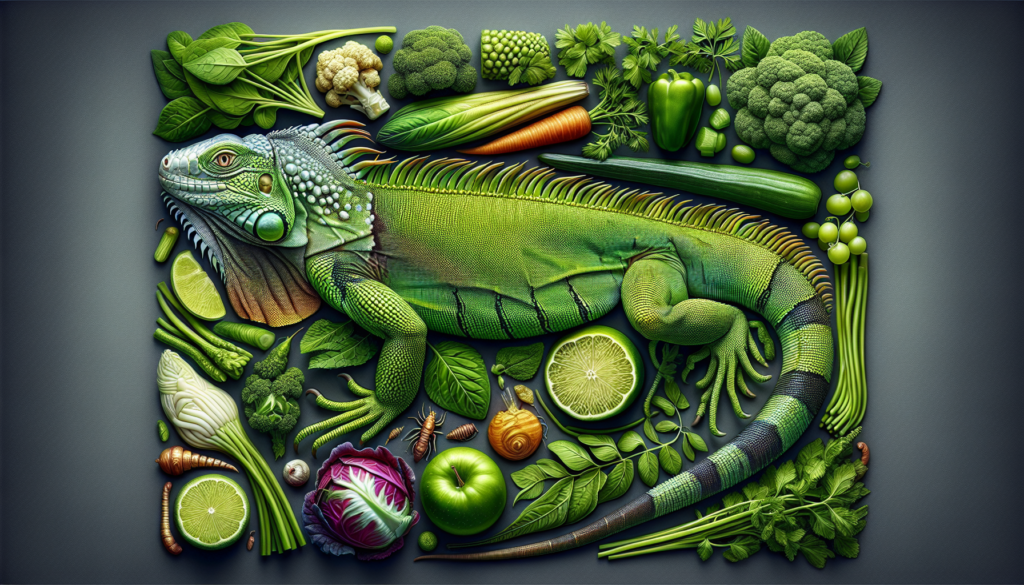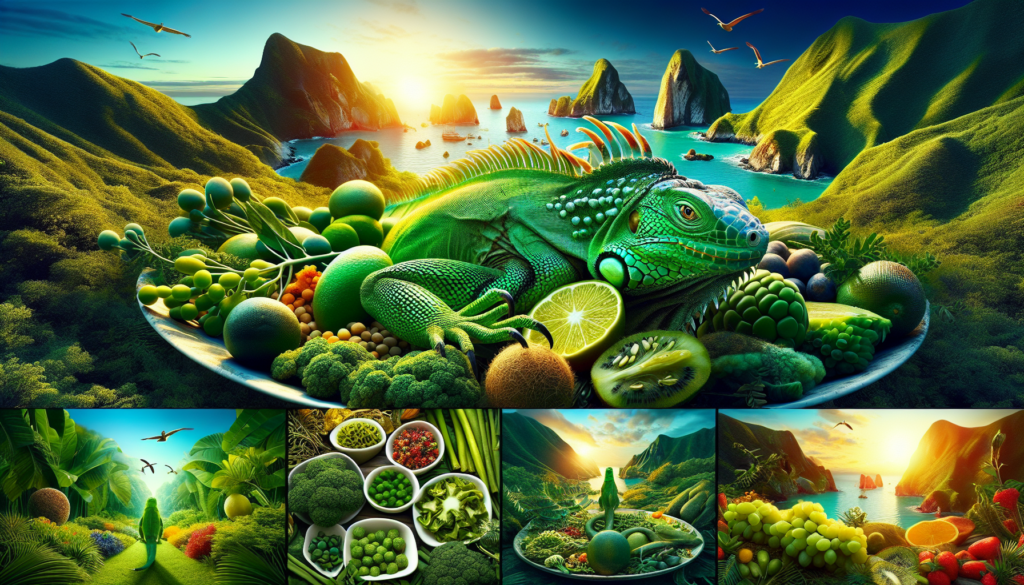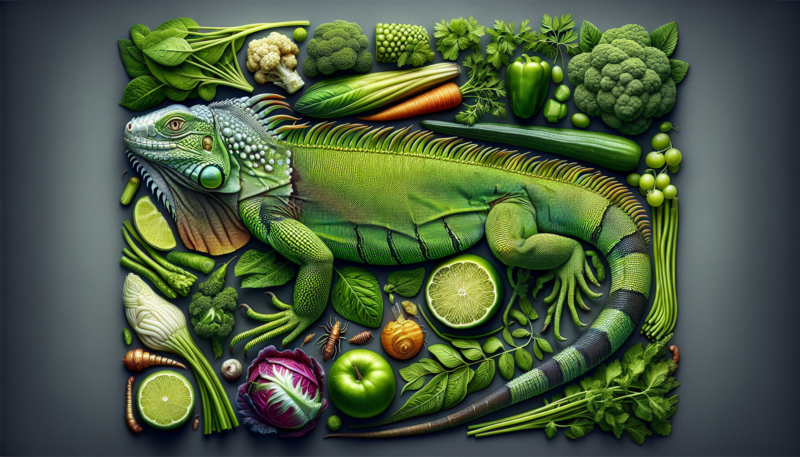Did you ever wonder what a green iguana eats? From fruits and vegetables to flowers and leaves, the diet of a green iguana is nothing short of diverse. These beautiful reptiles are primarily herbivorous and require a variety of plant-based foods to meet their nutritional needs. In this article, we will explore the fascinating world of a green iguana’s diet, shedding light on the specific foods they crave and why it is crucial for their overall health. So, if you’ve ever been curious about what makes up a green iguana’s mealtime, get ready to discover a colorful palette of delicious greens and vibrant treats that keeps these magnificent creatures thriving.

Feeding Habits of Green Iguanas
Green iguanas are herbivorous creatures, meaning they primarily consume plant-based diets. Their feeding habits are crucial to their overall health and well-being, so it’s important to understand what foods they should be consuming. In order to ensure that your green iguana thrives, it is necessary to provide a varied and balanced diet that consists of different types of vegetables, leafy greens, fruits, and even sources of protein.
Plant-Based Diet
As mentioned earlier, green iguanas are strictly herbivorous and rely solely on plant matter for their nutritional needs. Unlike their carnivorous counterparts, green iguanas do not consume any form of meat. Therefore, it is essential to provide them with a diet that is rich in plant-based foods.
Variety of Vegetables
To provide your green iguana with a well-rounded diet, it is crucial to offer a variety of vegetables. This ensures that they receive a wide range of nutrients. Some excellent vegetable options for green iguanas include squash, bell peppers, and carrots. These vegetables are not only nutritious but also appealing to their taste buds.
Leafy Greens
Leafy greens play a vital role in a green iguana’s diet. They are a great source of vitamins and minerals that are essential for their growth and overall health. Some popular leafy greens that green iguanas enjoy include kale, collard greens, and mustard greens. Incorporating these into their daily diet can greatly contribute to their well-being.
Fruits
Although fruits should be offered in moderation due to their higher sugar content, they still play a role in a green iguana’s diet. Fruits such as mangoes, strawberries, and papayas can be given as occasional treats to add variety and flavor to their meals. It’s important to remember not to overindulge them in fruits, as too much sugar can be detrimental to their health.
Protein Sources
While green iguanas primarily consume plant-based diets, they do require some protein in their diet. In the wild, they often derive this protein from consuming insects, rodents, and even small birds’ eggs. However, it’s important to note that captive green iguanas can obtain their protein requirements through alternative sources such as commercially available iguana food pellets. These specially formulated pellets are designed to meet their nutritional needs and should be offered in moderation.
Grazing Behavior
Green iguanas exhibit unique grazing behavior, which influences how they obtain and consume their food.
Constant Foraging
Green iguanas are known for their constant foraging behavior. They are typically seen nibbling on plants throughout the day to meet their nutritional needs. Their constant desire to eat is due to their high metabolism, allowing them to process large quantities of food.
Selective Eating
Despite their constant foraging, green iguanas can be quite selective eaters. They may have specific preferences for certain types of plants or vegetables, while completely ignoring others. It’s essential to observe and determine your green iguana’s preferred food choices so that you can provide them with a diet they enjoy and will readily consume.
A Juvenile Iguana’s Diet
As green iguanas grow and develop, their dietary requirements change. Juvenile iguanas have slightly different needs compared to adult iguanas.
More Protein
Juvenile iguanas require a slightly higher amount of protein compared to adult iguanas. This is because they are still growing and experiencing rapid development. It is essential to provide them with protein sources such as insects or commercial iguana food pellets to support their growth.
Less Plant Matter
While juvenile iguanas still require plant matter in their diet, the ratio of plant matter to protein sources is slightly different from that of adult iguanas. Juvenile iguanas should be given a diet that consists of more protein and less plant matter to ensure adequate growth and development.
Dietary Changes with Age
As green iguanas age, their dietary needs change, and the balance between plant matter and protein sources shifts.
More Plants
As green iguanas reach adulthood, their diet should consist primarily of plant matter. This includes a variety of vegetables and leafy greens. Adult iguanas no longer require the same level of protein intake as juveniles, as their growth rate slows down significantly.
Less Protein
While protein sources are still important in adult iguanas’ diets, they should be offered in moderation. By this stage, most of their protein needs can be fulfilled through a plant-based diet. Overfeeding them with protein can lead to health issues, so it’s important to strike the right balance.

Supplementing Dietary Components
To ensure that your green iguana receives all the necessary nutrients, it may be beneficial to supplement their diet with certain components.
Calcium and Vitamin Supplements
Calcium and vitamin supplements are essential for the overall health of green iguanas. These supplements help prevent nutrient deficiencies and promote proper bone growth. It is recommended to provide calcium and vitamin D3 supplements regularly, either in the form of powdered supplements or by using UVB lighting, which helps the iguana produce vitamin D3 naturally.
Water Intake
While green iguanas primarily obtain their water needs from the food they consume, it’s still important to ensure they have access to clean, fresh water. Make sure to provide a shallow dish of fresh water for them to drink from and replenish it regularly to ensure they stay hydrated.
Safe Foods for Green Iguanas
Certain types of foods are safe and highly beneficial for green iguanas to consume regularly. These foods provide them with essential vitamins and minerals.
Leafy Greens
Leafy greens are a staple in a green iguana’s diet and can be fed plentifully. Some safe and nutrient-rich leafy greens for green iguanas include kale, collard greens, and mustard greens. These greens provide a good mix of vitamins A, B, C, and K, as well as important nutrients like calcium.
Vegetables
Offering a variety of vegetables can help provide a well-rounded diet for green iguanas. Safe vegetable options for them include squash, bell peppers, and carrots. These vegetables are not only packed with essential nutrients but also offer different tastes and textures to keep your green iguana engaged and interested in their meals.
Fruits
While fruits should be treated as occasional treats due to their sugar content, some safe fruits can be offered to green iguanas. Mangoes, strawberries, and papayas are all examples of fruits that can be given in small amounts to add variety to their diet. Remember to keep fruit consumption minimal, as excessive sugar intake can lead to health problems.
Vegetables for Green Iguanas
Vegetables are an important part of a green iguana’s diet. Providing a variety of vegetables ensures that they receive a wide array of nutrients.
Squash
Squash is a versatile vegetable that can be offered to green iguanas. Varieties such as butternut squash, acorn squash, and yellow squash are rich in vitamins A and C, as well as minerals like potassium and magnesium. Chopping them into small, bite-sized pieces allows for easy consumption.
Bell Peppers
Bell peppers are another excellent vegetable to include in a green iguana’s diet. These colorful peppers are packed with vitamins A, C, and E, as well as fiber. It is recommended to offer bell peppers in various colors to ensure your green iguana receives a range of nutrients.
Carrots
Carrots are not only a vibrant and visually appealing vegetable but also a nutritious one. They are a great source of beta-carotene, vitamin K, and potassium. Cutting them into small, manageable pieces makes them easier for green iguanas to consume.
Leafy Greens for Green Iguanas
Leafy greens are a crucial component of a green iguana’s diet. These greens provide essential vitamins, minerals, and fiber that promote good health.
Kale
Kale is a nutrient-dense leafy green that green iguanas enjoy. It is rich in vitamins A, C, and K, as well as calcium and iron. Offering kale on a regular basis helps support their overall health and provides them with the necessary nutrients they need.
Collard Greens
Collard greens are another excellent leafy green option for green iguanas. They are a great source of vitamins A, C, and K, as well as calcium. Including collard greens in their diet contributes to healthy bones and overall well-being.
Mustard Greens
Mustard greens are a leafy green that offers a distinct peppery taste. They are packed with vitamins A, C, and K, as well as important minerals like calcium and potassium. Adding mustard greens to your green iguana’s diet provides them with a flavorful and nutritious option.
Fruits for Green Iguanas
While fruits should be given in moderation, they can add variety to a green iguana’s diet and offer some nutritional benefits.
Mangoes
Mangoes are a tropical fruit that green iguanas can enjoy as an occasional treat. They are a source of vitamins A, C, and E, as well as dietary fiber. Offering small, diced pieces of mango can provide a tasty and healthy addition to their diet.
Strawberries
Strawberries are another fruit that green iguanas may enjoy. They contain beneficial antioxidants, vitamins C and K, and fiber. It’s important to offer strawberries sparingly due to their sugar content, but as an occasional treat, they can delight your green iguana’s taste buds.
Papayas
Papayas are a tropical fruit that can be given to green iguanas on occasion. They are rich in vitamins A, C, and E, as well as potassium and dietary fiber. Offering small, diced pieces of papaya as a special treat can provide a refreshing and nutritious option for your green iguana.
Protein Sources for Green Iguanas
While green iguanas are primarily herbivorous, they still require small amounts of protein in their diet. Here are some suitable protein sources for them.
Insects
In the wild, green iguanas consume insects as part of their protein intake. Crickets, mealworms, and waxworms can be offered as occasional treats. These insects should be gut-loaded to ensure they are nutritionally beneficial for your green iguana.
Rodents
Some owners opt to include rodents such as pinkie mice in their green iguana’s diet. However, this should be done with caution and in moderation. It is essential to ensure that any rodents offered are appropriately sized for your iguana and bred specifically for reptile consumption.
Eggs
Another option for providing protein to green iguanas is through eggs. Offered in moderation, scrambled or hard-boiled eggs can be a good source of protein. Egg whites are typically the preferred part, as the protein is more easily digested by green iguanas.
By understanding the feeding habits and dietary requirements of green iguanas, you can ensure that your scaly friend thrives on a well-rounded and nutritious diet. Remember to provide a variety of vegetables, leafy greens, and occasional fruits, while also incorporating appropriate protein sources. With a careful and balanced approach to their diet, you can help your green iguana lead a healthy and vibrant life.
